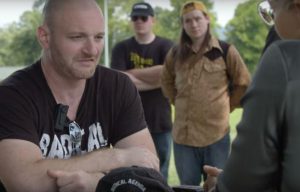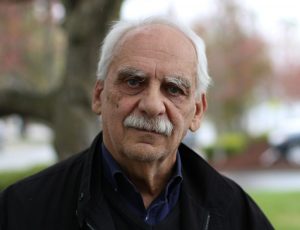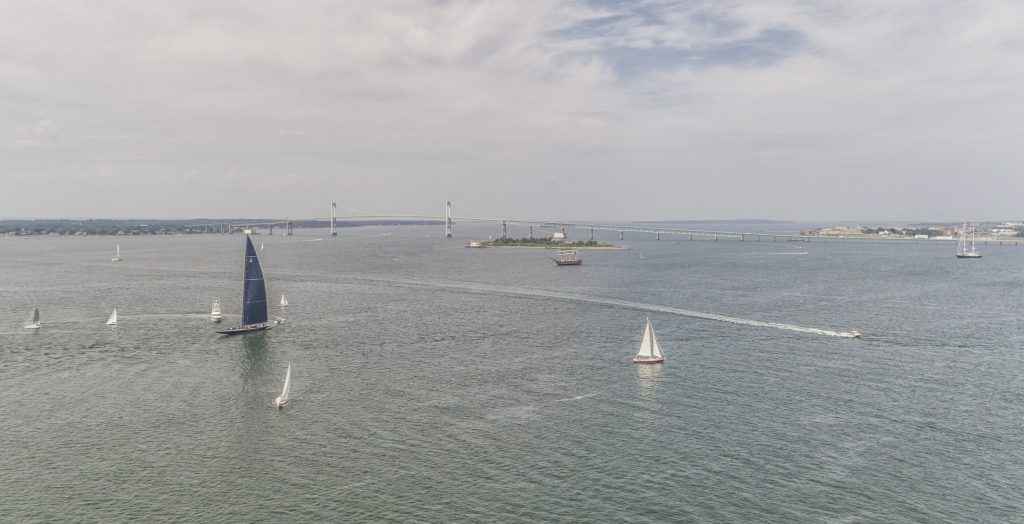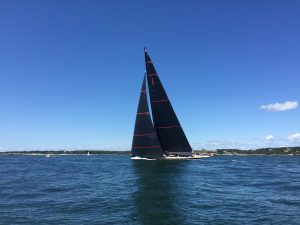Episode 56: Protest

The events in Charlottesville, Virginia earlier this month have echoes in New England. This week, we hear local reactions to seeing a Keene, New Hampshire local featured in a documentary about white supremacists at Charlottesville, and we recon with a quieter kind of racism in Boston in the wake of the “Free Speech” rally and counter-protest last Saturday. Plus, Granite Staters get the chance to “ask a Muslim anything.” Later in the show, we visit a Maine school on the cutting edge of composting, and a yacht race that is a reminder of another time.
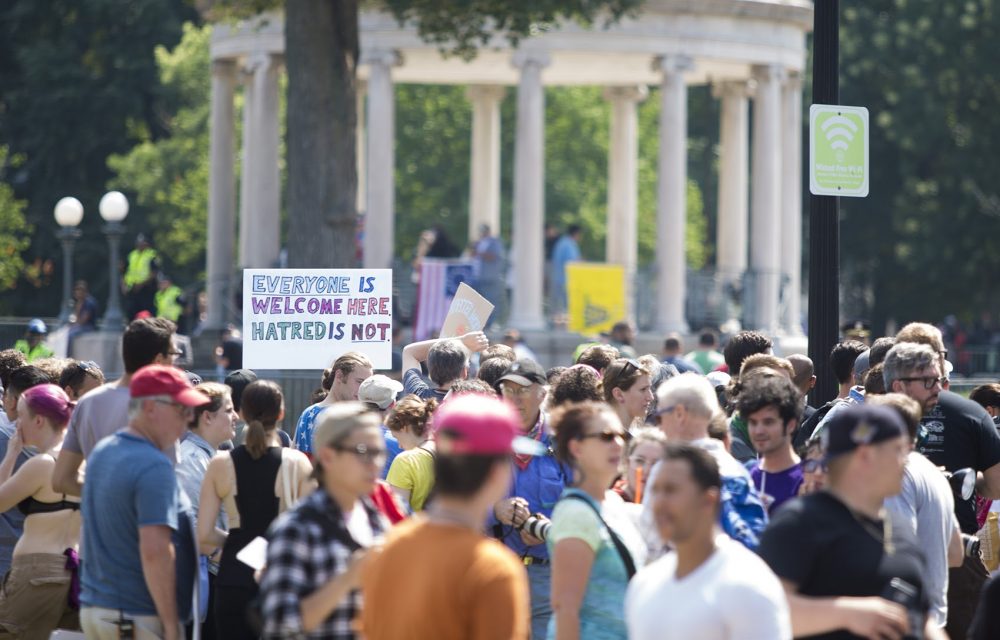
Counter protesters amassed outside of the barriers at the Parkman Bandstand on Boston Common on August 19. Photo by Jesse Costa for WBUR
Grappling With Race and Inclusion in the Granite State
It’s been two weeks since a white supremacist rally in Charlottesville, Virginia, led to violent clashes between neo-Nazis and counter-protesters. One anti-fascist demonstrator was killed and many were injured when a car, driven by one of the alt-right marchers, plowed into a group of people.
The events of the weekend were captured in a documentary by VICE News and HBO called “Charlottesville, Race and Terror.”
The main subject of that report is Christopher Cantwell, 36, from Keene, New Hampshire, who advocates online for what he calls a white “ethno-state,” and promises violence.
Cantwell’s tone changed somewhat in a video he shot himself, following news that authorities were seeking him in connection with violence at the rally. He has since surrendered to police, facing two felony counts of illegal use of tear gas, and one count of malicious bodily injury by means of a caustic substance.
We’re joined by New Hampshire Public Radio reporter Britta Greene, who has been following Cantwell’s story, and getting reaction from the Keene community.
Where Christopher Cantwell spreads a message of hate, Exeter resident Robert Azzi is working to spread understanding. The Lebanese-American Muslim photojournalist is traveling around New Hampshire hosting a series of conversations he calls “Ask a Muslim Anything.” WBUR’s Anthony Brooks reports.
Dialogue between people of different races — or faiths — has been difficult in the weeks following Charlottesville. And one of the trickiest conversations has been about physical images of our racist past.
While New England doesn’t have many debates about Confederate statues, the history of white settlers and their relationship with indigenous people is also fraught. This week, Yale University announced that it would remove a stone carving of a Puritan aiming a musket at Native American.
As New Hampshire Public Radio’s Jason Moon reports, a mural in a Durham, New Hampshire post office has also sparked a controversy.
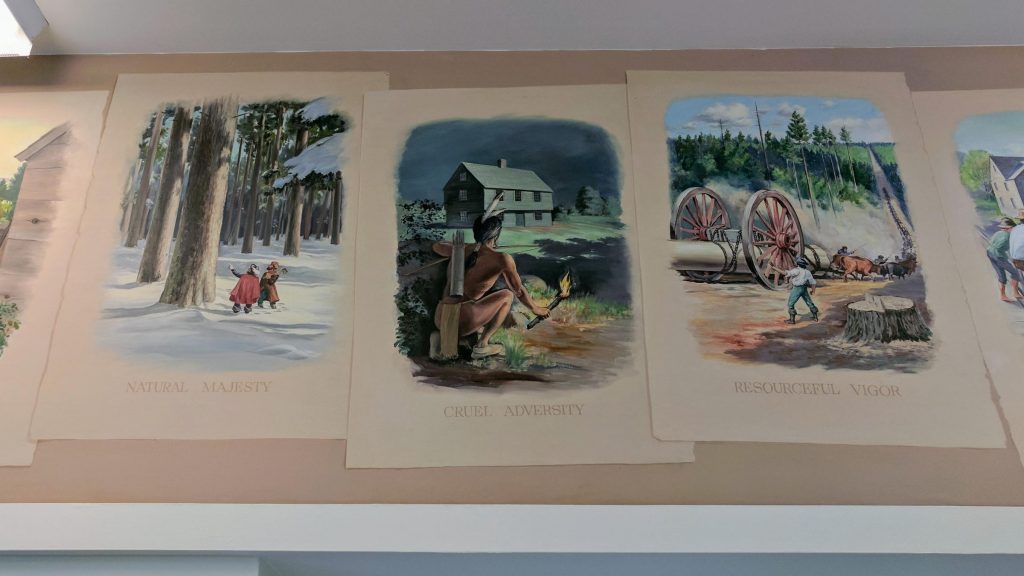
A mural including 16 images representing town history, including a Native American carrying a flaming torch and looking out at a colonial cabin, was commissioned by the Women’s Club of Durham in 1959. Photo by Jason Moon for NHPR
Moving the Needle on Systemic Racism in Boston
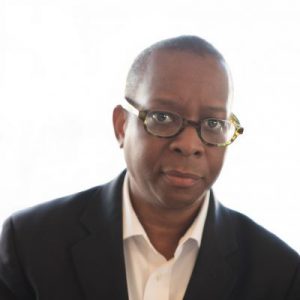
Kevin Peterson is founder of the Boston-based New Democracy Coalition and a senior fellow at the Center for Collaborative Leadership at the University of Massachusetts at Boston.
The scene at a so-called “Free Speech” rally in Boston last Saturday offered a stark contrast to the events in Charlottesville the weekend before. A few dozen attendees of the conservative rally were met on the Boston Common by an estimated 40,000 counter-demonstrators.
Boston police didn’t allow the protesters or the media to get near the rally, so their message couldn’t be heard.
Many in Boston, including our guest Kevin Peterson, applauded the counter-protesters — a majority white crowd — for standing up to bigotry and hatred. But in a column for WBUR’s Cognoscenti, Peterson asks Bostonians to now do something more difficult: work to counter systemic, historic, everyday racism in their city.
First Class Compost, J Class Yachts
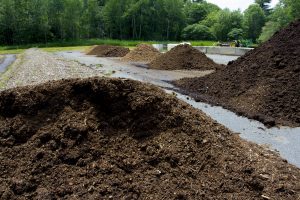
The Maine Compost School teaches the right way to compost with a series of test piles. Photo by Nick Woodward for Maine Public Radio
A few times a year, people from all over the US — and well beyond — trek to Maine to learn the science of all things rotten.
The Maine Compost School has been teaching people how to turn organic trash into treasure for 20 years, making it the longest-running program of its kind in the U.S. Maine Public Radio’s Jennifer Mitchell takes us there.
Newport Rhode Island is a world capital for sailing. This week, the city is host to a first in the sailing world: the J Class World Championship.
J-Class yachts are rare, and they’re huge. Picture a sailboat about as long as a basketball court racing around Newport harbor. Rhode Island Public Radio’s John Bender went to take a look.
About NEXT
NEXT is produced at WNPR.
Host: John Dankosky
Producer: Andrea Muraskin
Executive Producer: Catie Talarski
Digital Content Manager/Editor: Heather Brandon
Contributors to this episode: Britta Greene, Jason Moon, Jennifer Mitchell, and John Bender
Music: Todd Merrell, “New England” by Goodnight Blue Moon
We appreciate your feedback! Send praise, critique, suggestions, questions, story leads, and photos of your compost pile to next@wnpr.org.

